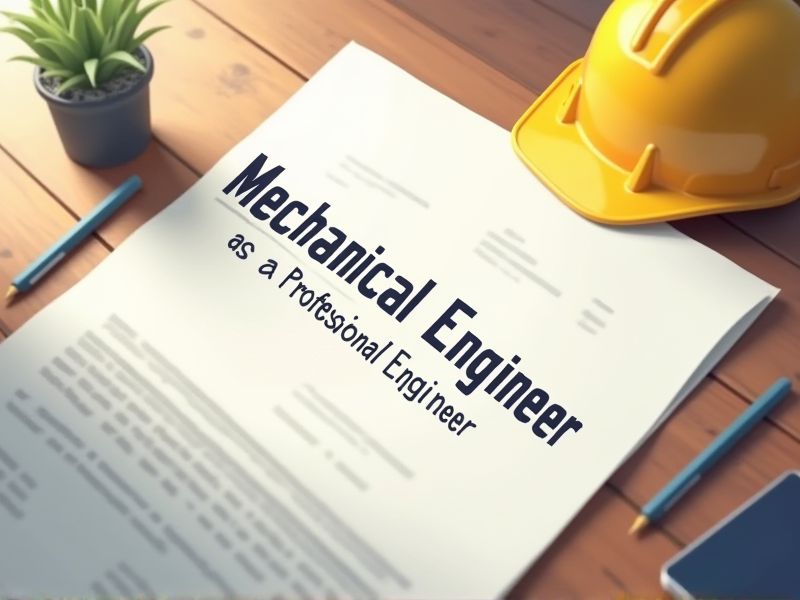
Obtaining certain certifications ensures that a Mechanical Engineer, licensed as a Professional Engineer, stays updated with technological advancements and industry standards. Certifications demonstrate a commitment to professional growth and competency in specialized areas. They increase job opportunities and credibility among peers and employers. Here are some important certifications for Mechanical Engineers licensed as Professional Engineers.
Professional Engineer (PE) License
The PE license certifies a mechanical engineer's adherence to high standards of safety and reliability, which is crucial for public trust and infrastructure integrity. Without it, mechanical engineers may not legally sign off on projects, limiting their career opportunities and professional recognition. Many government and industrial projects mandate a PE license for mechanical engineers to ensure compliance with regulations and standards. The license enhances career prospects by opening pathways to leadership roles and specialized projects that require certified expertise.
Certified Energy Manager (CEM)
A Certified Energy Manager credential equips a Mechanical Engineer with expertise to identify and implement energy-saving opportunities, leading to reduced operational costs. It enhances credibility and positions the engineer as a qualified professional in energy management, which can attract clients seeking sustainable solutions. The CEM designation provides updated insights into energy policies and technologies, ensuring compliance with evolving standards and regulations. Mechanical Engineers with this certification can contribute more effectively to projects that prioritize energy efficiency and environmental responsibility.
Project Management Professional (PMP)
Mechanical engineers licensed as Professional Engineers often face complex projects that require effective coordination and planning. Earning a Project Management Professional (PMP) certification improves an engineer's ability to manage timelines, resources, and budgets efficiently. The PMP credential holds recognition across industries, enhancing an engineer's credibility and career advancement possibilities. Employers often prefer professionals with a PMP certification due to their proven competency in leading project teams successfully.
Certified Quality Engineer (CQE)
Certified Quality Engineer (CQE) certification equips a Mechanical Engineer with specialized knowledge in quality assurance and process improvement, which directly impacts product reliability and customer satisfaction. Increased quality control skills lead to reduced defects and waste, enhancing overall project efficiency and cost-effectiveness. This certification fosters a deeper understanding of statistical techniques and risk management, enabling better decision-making in engineering projects. Employers recognize this as a benchmark for excellence, offering a competitive advantage and potential for career growth.
Certified Manufacturing Engineer (CMfgE)
The demand for a Certified Manufacturing Engineer (CMfgE) arises from the need to enhance expertise in manufacturing processes beyond what a typical mechanical engineering curriculum covers. A CMfgE certification equips a Professional Engineer with specialized skills in production operations, systems, and quality control, which are crucial for effective manufacturing management. In an increasingly competitive market, having both PE and CMfgE credentials can differentiate an engineer by demonstrating a strong commitment to professional growth and technical excellence. This dual qualification can lead to improved efficiency, reduced costs, and increased innovation within manufacturing projects.
Six Sigma Black Belt Certification
A Six Sigma Black Belt Certification enhances a Mechanical Engineer's problem-solving skills, enabling them to identify and eliminate defects in processes efficiently. Improved analytical capabilities through Six Sigma can lead to increased operational efficiencies, directly impacting the quality and reliability of engineering outputs. The certification provides a structured framework for continuous improvement, which aligns with the core principles of engineering ethics and professional responsibility. By achieving this certification, engineers can differentiate themselves in the competitive market, demonstrating a commitment to excellence and leadership in process optimization.
Lean Six Sigma Certification
Obtaining Lean Six Sigma Certification equips a Mechanical Engineer with skills in process improvement and waste reduction, which can enhance project efficiency and cost-effectiveness. This certification aligns with the engineer's role in optimizing systems and ensuring quality control, directly impacting production and operational processes. The structured problem-solving framework of Six Sigma supports an engineer's technical background in addressing complex industry challenges. Lean Six Sigma integrates data-driven decision-making, which complements the analytical skills of a licensed Professional Engineer, thereby increasing employability and career advancement opportunities.
ASHRAE HVAC Design Certification
The ASHRAE HVAC Design Certification provides specialized knowledge in the most up-to-date standards and practices for heating, ventilation, and air conditioning, enhancing a professional engineer's technical skills. This certification signals to employers and clients a commitment to excellence and continuous learning in the HVAC domain. Holding the certification can lead to more advanced career opportunities and responsibilities within the field. It also ensures that projects are designed with energy efficiency and sustainable practices in mind, aligning with industry trends and regulatory requirements.
Certified Safety Professional (CSP)
A Certified Safety Professional (CSP) enhances a Mechanical Engineer's expertise in identifying and mitigating workplace hazards, which ensures safety compliance. The additional certification often results in improved job performance, as it provides advanced safety knowledge beyond what a Professional Engineer license covers. Employers may prefer or require CSP-certified engineers, increasing job prospects and career advancement opportunities in industries focused on safety-sensitive projects. Possessing a CSP demonstrates a commitment to professional development, fostering trust and confidence among clients and colleagues in a risk-conscious environment.
Certified Reliability Engineer (CRE)
A Certified Reliability Engineer (CRE) augments a Professional Engineer's skills by focusing on ensuring mechanical systems maintain high operational reliability. This specialization reduces downtime and repair costs by implementing effective preventive maintenance strategies. Reliably engineered systems improve safety and compliance with regulatory standards. Enhanced reliability analysis capabilities can significantly extend the lifespan of machinery and components.
Summary
When you, as a reader, obtain certifications as a licensed Mechanical Engineer and Professional Engineer, you can enhance your expertise and employability. This often leads to increased job opportunities and potentially higher earning potential due to demonstrated specialized skills. Employers might be more inclined to trust your judgment in complex projects, resulting in greater responsibilities and leadership positions. You can expect these advancements to also expand your professional network, opening avenues for collaboration and innovation.
